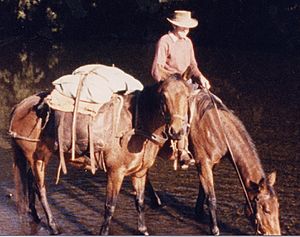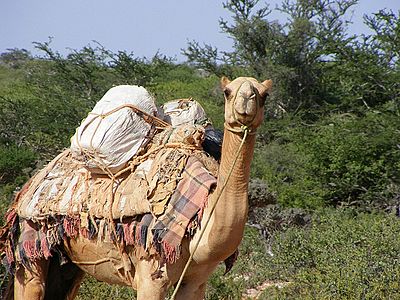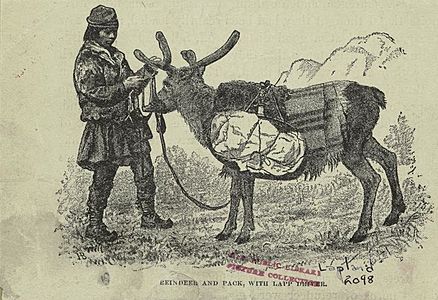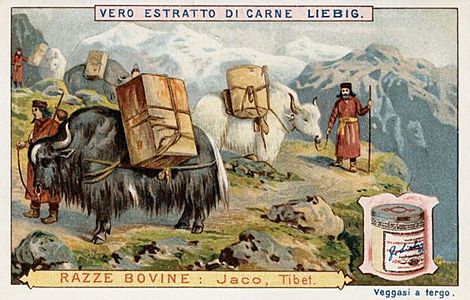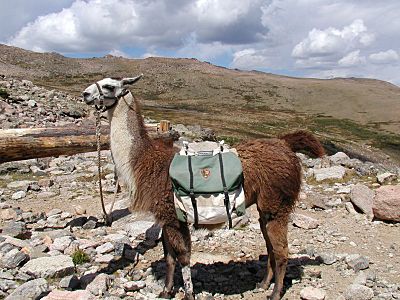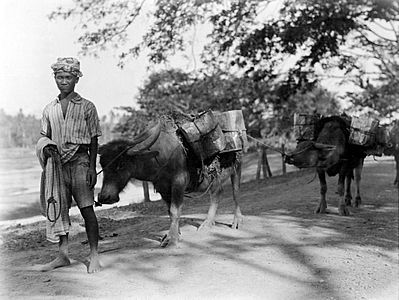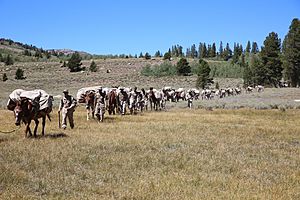Pack animal facts for kids
A pack animal is a special kind of working animal that helps humans move things. Instead of pulling a cart or a plow, pack animals carry items directly on their backs. Think of them as living delivery trucks! They are also sometimes called "beasts of burden."
Many different animals have been used as pack animals throughout history. Some common ones include camels, goats, yaks, reindeer, water buffaloes, and llamas. You might also know dogs, horses, donkeys, and mules as pack animals.
Contents
Pack Animals vs. Draft Animals
It's easy to get pack animals and draft animals mixed up, but they do different jobs.
- A pack animal carries things on its back.
- A draft animal pulls things behind it.
For example, sled dogs pull sleds, but they don't usually carry heavy bags on their backs. Similarly, elephants have been used for centuries to pull logs out of forests, not to carry them on their backs. Both are working animals, but their methods of moving loads are different.
Amazing Pack Animals Around the World
Many types of animals have been trained to carry loads. These include large animals like camels, yaks, reindeer, goats, and water buffaloes. Animals from the horse family, such as horses, donkeys, and mules, are also very common. Even some dogs can be trained to carry small loads!
-
Pack llama, Rocky Mountain National Park, Colorado
-
Pack water buffalo, Sumbawa, Indonesia, early 20th century
-
Pack donkeys, Devon, England, c. 1906
How Pack Animals Are Used
For a long time, especially during the Middle Ages, pack animals were the main way to move goods. People didn't have cars or trucks, so they relied on animals. Over time, wagons pulled by horses and oxen became more common, but pack animals were still very important.
Pack animals often wear special pack saddles. These saddles help distribute the weight of the load evenly across the animal's back. They can also have saddlebags attached to hold items.
Today, many nomadic tribes still use pack animals. But there's also a new use for them in tourism! In places like the High Atlas mountains in Morocco, visitors can go on trips where pack animals carry their gear. This makes hiking and exploring much easier. Even some National Parks in America allow pack animals for visitors, with certain rules.
Even modern military groups, like special forces, sometimes use pack animals. They get training on how to use horses, mules, llamas, camels, dogs, and elephants to carry supplies in tough areas.
How Much Can They Carry?
The amount a pack animal can carry depends on its size, strength, and the type of animal.
- A camel can carry about 300 kilograms (660 pounds).
- Yaks are very strong. Some can carry up to 390 kilograms (860 pounds) for short distances!
- Llamas can carry about a quarter of their own body weight. So, a llama weighing 200 kilograms (440 pounds) could carry about 50 kilograms (110 pounds).
- Mules are also strong. The US Army suggests a mule can carry about 20% of its body weight in mountains. This means a mule could carry around 90 kilograms (200 pounds).
- Reindeer can carry up to 40 kilograms (88 pounds) for long periods in mountains.
Pack Animals Around the World
Different regions use different animals based on what's available and what works best in that environment.
- Arctic: Reindeer and sled dogs.
- Central and Southern Africa: Oxen, mules, donkeys.
- Central Asia: Bactrian camels, yaks, Horses, mules, donkeys.
- Europe and Asia: Donkeys, oxen, Horses, mules.
- North America: Horses, mules, donkeys, goats.
- North Africa and Middle East: Dromedaries, horses, donkeys, mules, oxen.
- Oceania: Donkeys, horses, dromedaries, mules, oxen.
- South America: Llamas, donkeys, mules.
- South and Southeast Asia: Water buffaloes, yaks, Asian elephants.
Images for kids
-
Donkeys packed on the way to a mine in Alma, Colorado, late 1880s.
 | Sharif Bey |
 | Hale Woodruff |
 | Richmond Barthé |
 | Purvis Young |


